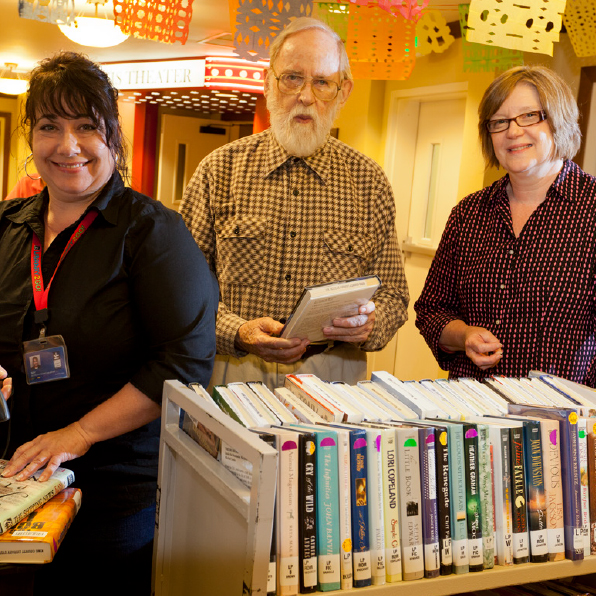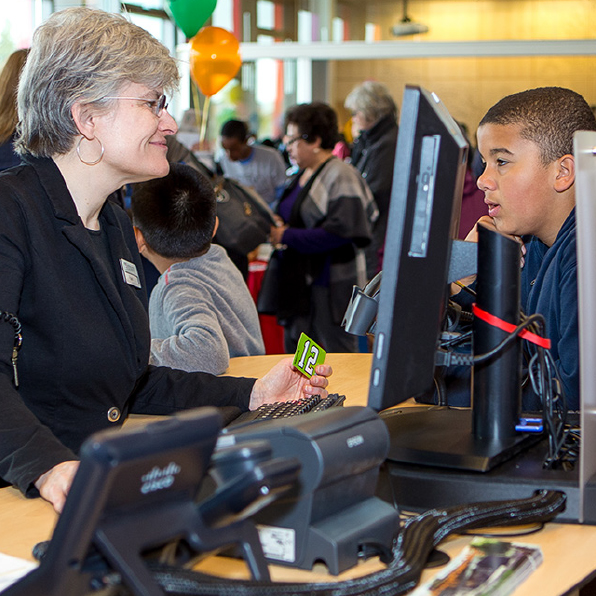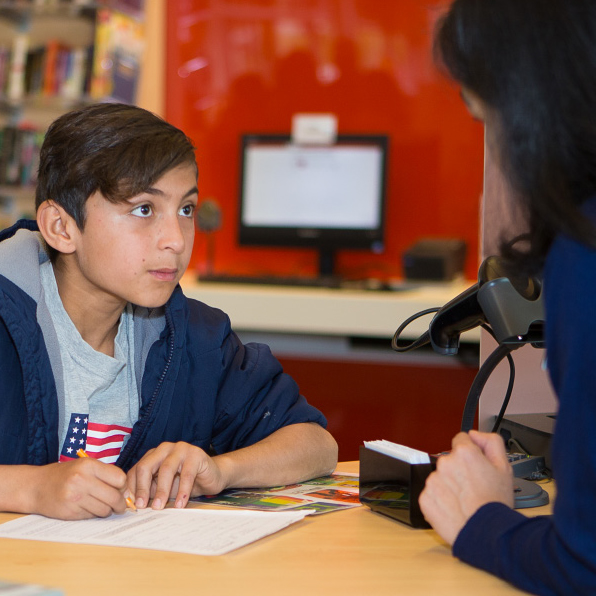Strategic Framework
Guiding and Aligning Our Work, 2023-2027
King County Library System’s (KCLS) Strategic Framework and its elements were thoughtfully developed after broad input from patrons, community leaders and partners, educators and staff in 2016. It reflects KCLS’ commitment to public service and accountability, and a deep intention to enhance lives, forge connections and strengthen communities.
Since implementation of the Strategic Framework in 2018, KCLS has completed more than 50 projects that advance the Library System’s strategic goals. These include projects that improve business processes, enhance customer service and increase alignment with KCLS’ values. Remaining projects focus on development of services that inspire patrons and improve their library experience.
Strategic Focus
To Create Opportunities Through Meaningful Connections
We will do this by connecting people with
- Information and services to navigate life’s complexities and biases
- Equitable avenues to build the skills and knowledge needed for success
- One another to bridge differences and create communities of inclusion and belonging
Continued Commitments
Customer service through helpful and expert staff; a robust and diverse collection of books and resources; responsive programs and services and welcoming library spaces.
Centering Communities Most Impacted by Systemic Inequities
With the completion of its comprehensive 2021-22 DEI Assessment, KCLS has intentionally leaned into its core values of Diversity, Equity and Inclusion by adding to its Strategic Framework the four DEI strategic pillars of Systems, Co-creation, Well-Being and Accountability. These pillars work together to weave a connection between the principle of centering communities most impacted by systemic inequities and the implementation of KCLS’ services and projects.
Pillar #1: Systems
Systematically apply a DEI lens to internal processes and resources.
To effectively serve and welcome diverse communities into the libraries, KCLS must have appropriate internal infrastructure and support in place.
Pillar #2: Co-Creation
Co-create and evaluate services with most impacted communities.
KCLS should proactively engage communities most impacted by systemic inequities at every stage of public service design and development.
Pillar #3: Well-Being
Adopt a trauma-informed approach to staff well-being.
Staff who are cared for, valued and who feel a sense of belonging in the workplace, are best positioned to create that same environment for patrons.
Pillar #4: Accountability
Communicate DEI accountability to the public.
KCLS must communicate its DEI goals and progress clearly and proactively. Doing so keeps the organization publicly accountable for its commitments to its most impacted communities.
Strategic Goals
Organizational Excellence
KCLS has clear priorities and effective practices; high-performing leadership and staff; financial stability and a healthy culture.
We measure our performance and use what we learn to make sound decisions.
Focus: Improve financial management; organizational culture; and knowledge, skills and abilities of staff.
Strategic Communication
KCLS communication is clear, timely and intentional. Residents, partners and supporters recognize KCLS as an essential contributor to their lives. Staff use internal standards, practices and tools that inform, educate and connect us with one another.
Focus: Improve internal and external communication and workflow processes.
Responsive, Inspirational Service
KCLS offers customized pathways to exciting, relevant opportunities that inspire innovation, creation, learning and reflection. KCLS connects with people and organizations to leverage community strengths and enhance experiences.
Focus: Increase responsiveness to changing technology needs and reduce barriers to access.
Communities of Inclusion and Belonging
KCLS continually works to increase equity, strengthen bonds and support individual and community identities by embracing and reflecting the diversity of our communities.
Focus: Improve patron experience and responsiveness to community interests.
2023 Projects
The Budget includes funding for key initiatives that align with KCLS’ four strategic goals and work toward centering communities most impacted by systemic inequities.
Responsive, Inspirational Service
- Engage in community-led library programs and services that center communities most impacted by systemic inequity.
- Improve and expand services to linguistically diverse communities.
- Build on programs supporting economic recovery and self-sufficiency so that residents may prosper and grow.
- Improve online access to library materials through technology upgrades.
Communities of Inclusion and Belonging
- Engage unstably housed people to increase access to library and partner services.
- Evaluate internal processes and guiding documents to improve library access.
- Assess the condition and accessibility of KCLS’ community libraries.
Organizational Excellence
- Assess organizational structure and staffing to increase services and workforce diversity.
- Study and plan for future initiatives that will improve employee engagement and support staff well-being.
- Engage in a classification and compensation study to align KCLS with industry standards and implement related DEI recommendations.
- Improve workflow processes in the Collection Management Services department through a LEAN assessment.
- Implement technology security initiatives to improve best practices in KCLS’ business operations.
Strategic Communication
- Use a variety of messaging strategies to provide regular, clear and proactive progress reports toward KCLS’ DEI goals.
- Increase options for patrons and community members to provide feedback, co-create services, and control communications from KCLS.
- Engage staff in a day of learning that will focus on improving service to patrons, supporting work teams through ongoing transitions, and developing core competencies.
- Expand the functionality of the internal help desk system to provide a primary point of contact for all staff requests for support services.







